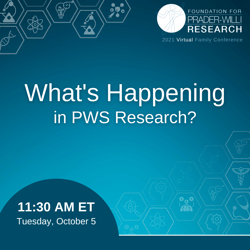 |
What's Happening in PWS Research?
Dr. Theresa Strong and the FPWR Research Team share highlights of our FPWR research initiatives. Learn more about what is happening in PWS research and what you can be excited about! Watch the presentation >>
|
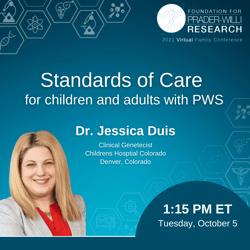 |
Standards of Care for People with PWS
Dr. Jessica Duis sees hundreds of patients with PWS and in this session, she provides an overview of care for people with PWS, supplements, genetics, behavior management, therapy, and more. Watch the presentation >>
|
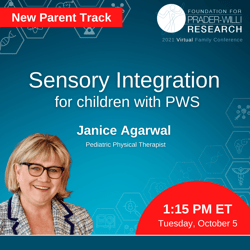 |
New Parent Track: Sensory Integration
Motor milestones and sensory awareness need to be addressed together by each and every therapist along with you! Every child with PWS has significantly decreased awareness. Learn the term AND how you can change the outcomes so your child can thrive! You will end the session with fun things you can do immediately. Watch the presentation >>
|
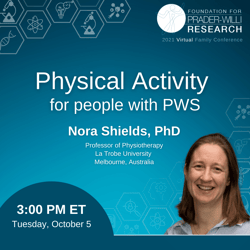 |
Physical Activity for People with PWS
People with PWS often struggle with being physically active. In this presentation, Dr. Nora Shields shares current research evidence on exercise for people with PWS and discusses how physical activity can be incorporated into daily routines. Watch the presentation >>
|
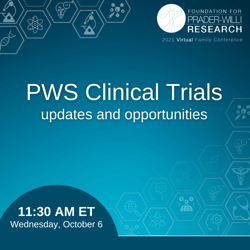 |
PWS Clinical Trials Panel
Stay up to date and learn the latest in current PWS clinical trials directly from trial representatives. Panelists include representatives from 6 different PWS studies: Guanfacine, CBD-V, oxytocin, Pitolisant, CBD, Tesomet, and ARD-101.
Watch the presentation >>
|
|
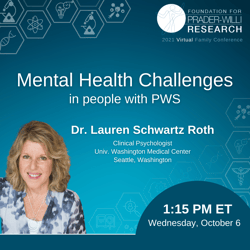
|
PWS Mental Health Challenges
What do mental health challenges look like in PWS? What are early signs and how can we best intervene? When should we monitor behaviors and when is it time to get treatment? Dr. Lauren Schwartz Roth, a parent of a young adult with PWS and a clinical psychologist, discusses how we can effectively assess & manage mental health issues if they arise in our loved ones with PWS. Watch the presentation >>
|
|
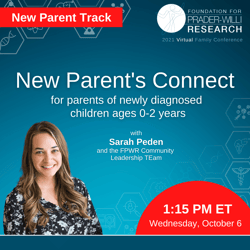
|
New Parent Track: New Parents Connect
This session, designed for our newly diagnosed families, provides an introduction to the genetics of PWS and answers your frequently asked questions. Learn more about having a loved one with PWS from our panel of parents who are traveling this journey alongside you. Watch the presentation >>
|
|
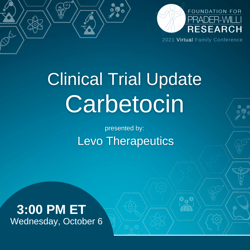
|
Carbetocin Clinical Trial Results & Community Update
Levo Therapeutics has announced the promising results of their phase 3 clinical trial of carbetocin. In this presentation, they provide greater insights into the trial data as well as next steps for making the drug available to treat PWS.
Watch the presentation >>
|
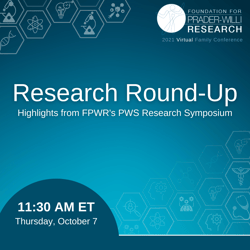 |
Research Round-Up: Highlights from FPWR's Research Symposium
Dr. Theresa Strong presents a digestible summary of more than 30 oral presentations and posters presented at FPWR’s annual research symposium. Learn how today’s PWS researchers are impacting our understanding of the complexities of PWS.
Watch the presentation >>
|
|

|
Partnering with Schools for a Successful IEP
Dr. Katy Chambers, former school principal and teacher of fifteen years and mom to Daniel (age 9)- who lives with PWS, shares her journey maneuvering the educational system from both sides of the IEP table. Hear her strategies which have been helpful as a parent, tips that help school staff better understand our children’s needs, and action plans that help ease the day-to-day stresses of monitoring the safety of our kids in the school setting. Watch the presentation >>
|
|
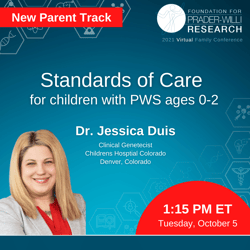
|
New Parent Track: Standards of Care for Children with PWS ages 0-2
Dr. Jessica Duis sees hundreds of patients with PWS and in this presentation, she provides an overview of general care for children ages 0 -2, supplements, genetics, behavior management, therapy, and more about her multidisciplinary approach. Watch the presentation >>
|
|
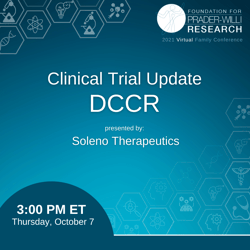
|
DCCR Clinical Trial Results & Community Update
Soleno Therapeutics has announced the promising results of their phase 3 clinical trial of DCCR. In this presentation, they provide new data and insights into the trial data as well as next steps for making the drug available to treat PWS.
Watch the presentation >>
|
|
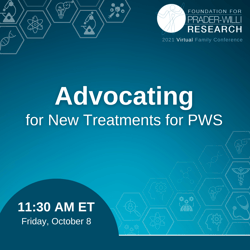
|
Advocating for New Treatments for PWS
Advocating for treatments for PWS has never been more important! Learn how you can make an impact at the FDA's upcoming Advisory Committee meeting for the review of Carbetocin as a potential treatment for PWS. Watch the presentation >>
|
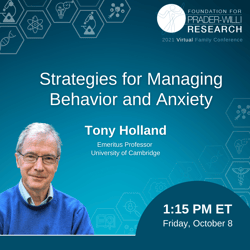
|
Strategies for Managing Behavior and Anxiety in PWS
People with PWS struggle with impaired cognition and social development which often lead to challenging behavior. In this presentation, Dr. Tony Holland discusses strategies for effective management and touches on recent research that shows promise in improving the behavior profile of PWS. Watch the presentation >>
|
.png?width=250&name=_2021%20Conference%20Sessions%20Website%20(1).png)
|
New Parent Track: Feeding Techniques for Children Ages 0-2
Learn how to develop and advance your child’s oral motor feeding skills using the following information: video swallow studies, oral motor development, feeding development, and special dietary needs.
Watch the presentation >>
|
|
.png?width=250&name=_2021%20Conference%20Sessions%20Website%20(2).png)
|
Sleep Disorders and PWS
People living with PWS often experience excessive daytime sleepiness and other symptoms due to sleep disorders. In this presentation, Dr. Aaron Chidekel discusses the science behind sleep and wakefulness, patient and caregiver experiences with sleep disorders. Then, Cindy Szapacs, mother to a teen with PWS, shares her experience with excessive daytime sleepiness and her lessons learned.
Watch the presentation >>
|







.png?width=250&name=_2021%20Conference%20Sessions%20Website%20(1).png)









.png?width=250&name=_2021%20Conference%20Sessions%20Website%20(2).png)











